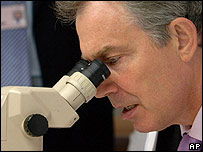 Listen to the 41 minute speech by Tony Blair on Science at The Royal Society or a 2 minute taster.
Listen to the 41 minute speech by Tony Blair on Science at The Royal Society or a 2 minute taster.
In 1963, a previous Labour prime minister, Harold Wilson, called for a new Britain to be "forged in the white heat of this [technological] revolution".
Nearly half a century on, Tony Blair is to call for more of the same. He told me that now, more than ever, our economic future is through "the brilliant light of science".
Unfinished business
This is a prime minister with a mission.
![]()
![]() I want to enthuse our young people particularly with the prospect of working in science
I want to enthuse our young people particularly with the prospect of working in science ![]()
![]()
"It's not just about being a boffin in a laboratory - it's actually about practical application and transforming lives, tackling the world's problems and doing so in a very practical way."
Specialist colleges
Mr Blair has also presided over a time where the numbers of young people studying physics and chemistry have dwindled by a fifth. And a quarter of schools have no qualified physics teachers.
This is a deficiency he acknowledges but says he's trying to put it right. ![]()
![]() We've got to invest in science far more as a country
We've got to invest in science far more as a country ![]()
"We've got to invest in science far more as a country.
"The government is tripling investment in science - to recruit better science teachers - which is why we're offering all sorts of incentives for that to happen.
"We've got specialist science and technology colleges which we are creating."
However, investment is well short of the target set by the European Union's aim of being the "most competitive, dynamic knowledge-based economy in the world".
That's a statement from the EU's Lisbon Strategy which aims to match the US's research funding of about 3% of GDP by 2010.
Currently, Britain's is just over 1% but it is set to increase to 2.5% by 2015. Other EU member nations are moving even more slowly.
The man who helped re-brand the Labour party believes that it's partly an image problem. It's a problem, he says, that's partly caused by the "antis" - the anti-GM groups, anti-vivisectionists and the anti-nuclear lobby that create a negative image of science. ![]()
![]() We should not get into the position of being anti-science as a country because how science is applied and how it's used is down to human beings to make decisions about
We should not get into the position of being anti-science as a country because how science is applied and how it's used is down to human beings to make decisions about ![]()
"We should not get into the position of being anti-science as a country because how science is applied and how it's used is down to human beings to make decisions about.
"But for us as a country, where the future is as a knowledge economy, science will, in my judgement, today and for future generations, be as important as economic stability was when we were handling the problems in the 1970s and 1980s and 1990s."
But that's what prime ministers have been saying for decades. Most researchers are delighted at what the government has done for them.
However, with huge research investment by India and China, senior researchers say that now is not the time to rest on laurels.
Exhortation and evangelism by the prime minister is welcomed - but on its own it, they say, it won't be enough.













